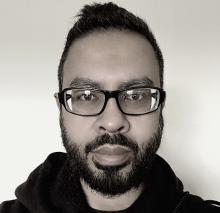THIS EVENT HAS BEEN POSTPONED TO THE FALL SEMESTER. NEW DATE FRI, SEPT 20, 2024.
A lecture by the Bangabandhu Sheikh Mujibur Rahman Research Fellow for 2023, Bertie Kibreah, Assistant Professor of Ethnomusicology, School of Music, University of South Florida.
Brian Bond, Lecturer (Music of India), Department of Music and Brent Eng, PhD Candidate, Department of Anthropology will serve as discussants at the event.
Event moderated by Elora Shehabuddin, Professor of Gender & Women’s Studies and Global Studies; Director, Subir and Malini Chowdhury Center for Bangladesh Studies, UC Berkeley
TALK ABSTRACT: What does it mean for a shrine-based debate to be a devotional performance? Echoing recent works on contemporary Sufisms that highlight the intersectionality of communities, repertoires, and narratives, Bangladesh’s bicār gān (“songs of rumination”) is an extemporized wellspring for articulating concurrent devotional subjectivities. In this performance, a network of interlocutors engage in an aggregative musicality that combines versified, saintly, and polemical elements into a staged discourse on loss, alterity, and sometimes absurdism. Drawing attention to interlocking tropes in ritual theory, migration studies, and the anthropology of media, this discursive devotionalism can be understood as a profoundly generative negotiation of space through converging pilgrimage routes, shrine committees, itinerant programming, stylized listening practices, and a popular folk music revival. Ultimately, bicār gān reifies a performance of devotion that is meandering, contingent, and suppositional, and is also informed by past and present border negotiations, inter-religious pieties, a transglobal citizenry, and Sufi media—within, between, and beyond Bengals.
SPEAKER BIO: Bertie Kibreah is Assistant Professor of Ethnomusicology at the University of South Florida. He joined the University of South Florida’s Music Faculty in 2022. He is an ethnomusicologist and South Asianist (PhD, University of Chicago), with interests in re-sounding the greater region of Bengal—an enduring focal point in South Asia—to be more inclusive of sonic histories and contemporary music life in Bangladesh, the Bay of Bengal, and the “Banglashere.” Bertie’s research is shaped by discourses of devotion, modernity, and migration—especially through the performative lens of pilgrimage, cultural industries, Sufi feminisms, and borderland musicking. He frequently draw on theories of difference (memory, partition, genocide studies), interconnectivity (Inter-Asian, Indian Ocean, Adivasi, and Asian American studies) as well as orality-aurality (sound studies, affect studies, the anthropology of media).
Bertie’s current book project explores and complicates trajectories of devotion through sonic geographies of the Bengal river delta, the musical placemaking of shrines, and the collectivized impressions of folk festivals within, between, and beyond Bengals (including adjacent Bengali pluralities). A second book project of his is concerned with intergenerational timbres and devotional memory in the larger realm of Bangladeshi global citizenries, as refracted by recent labor reforms in the Arab Gulf, newer migration routes into Europe via the Mediterranean, and the often overlooked “ethnoburbs” of Bangladeshi Americans.
Trained on the tabla, a prominent percussion instrument in South Asia, Bertie also sings in a variety of languages and performs on a number of additional instruments—especially from Bengal—including the dotara lute. The breath of his musical explorations—across linguistic and sonic borders—is fueled by the civic awareness of public humanities work and the artistic interactions of practitioners and communities.
Bertie is the recipient of a number of awards, most recently a research grant from USF College of the Arts, as well as the Bangabandhu Sheikh Mujibur Rahman Research Award administered through the Malini Chowdhury Center for Bangladesh Studies at UC Berkeley. Bertie is also incoming vice president for the Southeast/Caribbean chapter of the Society for Ethnomusicology.
_____________
The Bangabandhu Research Award allows us to bring one or two graduate students or early career faculty members each year from accredited institutions in the United States and in Europe to share their research on Bangabandhu and/or Bangladesh with the UC Berkeley community. This award has been established with the generous support of the US Bangabandhu Parishad, California.
Established in 2013 with a generous gift from the Subir & Malini Chowdhury Foundation, The Subir & Malini Chowdhury Center for Bangladesh Studies at UC Berkeley champions the study of Bangladesh’s cultures, peoples and history. The first of its kind in the US, the Center’s mission is to create an innovative model combining research, scholarships, the promotion of art and culture, and the building of ties between institutions in Bangladesh and the University of California.
Like us on FACEBOOK
For DIRECTIONS to the Institute please enter “Institute for South Asia Studies” in your google maps or click this GOOGLE MAPS LINK.
PARKING INFORMATION
Please note that parking is not always easily available in Berkeley. Take public transportation if possible or arrive early to secure your spot.
Event is FREE and OPEN to the public.
_____________
If you require an accommodation for effective communication (ASL interpreting/CART captioning, alternative media formats, etc.) or information about campus mobility access features in order to fully participate in this event, please contact Puneeta Kala at pkala@berkeley.edu with as much advance notice as possible and at least 7-10 days in advance of the event.

